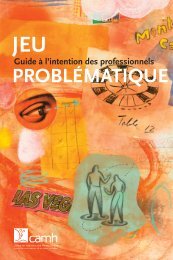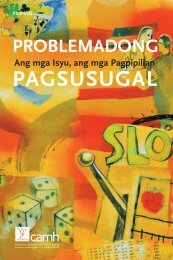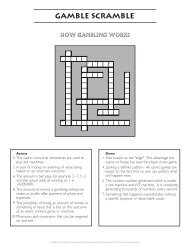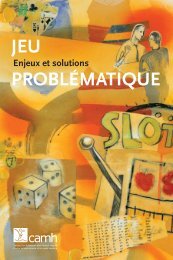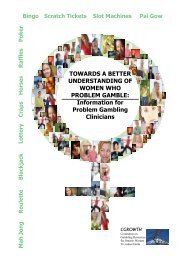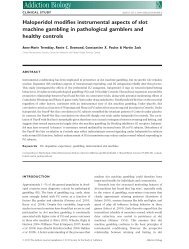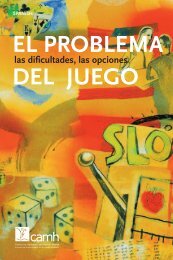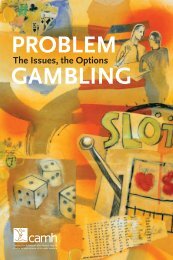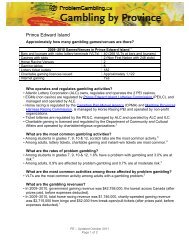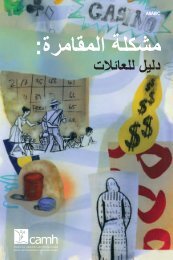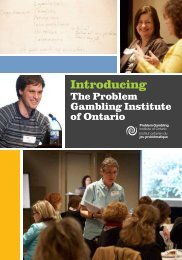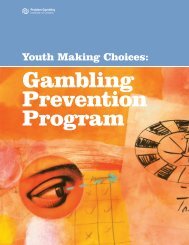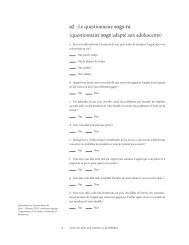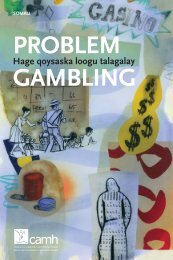Family Support and Psychoeducational Group Manual for Problem ...
Family Support and Psychoeducational Group Manual for Problem ...
Family Support and Psychoeducational Group Manual for Problem ...
You also want an ePaper? Increase the reach of your titles
YUMPU automatically turns print PDFs into web optimized ePapers that Google loves.
<strong>Family</strong> <strong>Support</strong> <strong>and</strong><strong>Psychoeducational</strong><strong>Group</strong> <strong>Manual</strong> <strong>for</strong><strong>Problem</strong> GamblingToula Kourgiantakis, MSW, RSW, RMFTMichael Weyman, MSW, RSWBrenda Teasell, MSW, RSWLisa Pont, MSW, RSW
<strong>Family</strong> <strong>Support</strong> <strong>and</strong> <strong>Psychoeducational</strong> <strong>Group</strong> <strong>Manual</strong> <strong>for</strong> <strong>Problem</strong> GamblingPrinted in CanadaCopyright © 2013 Centre <strong>for</strong> Addiction <strong>and</strong> Mental Health, <strong>Problem</strong> GamblingInstitute of Ontario, Toronto ONFacilitators offering this program have permission to download the manual <strong>and</strong>copy <strong>and</strong> distribute the h<strong>and</strong>outs <strong>for</strong> use by participants. Otherwise, no part ofthis work may be reproduced or transmitted (<strong>for</strong> profit or otherwise) in any <strong>for</strong>mor by any means electronic or mechanical, including photocopying <strong>and</strong> recording,or by any in<strong>for</strong>mation storage <strong>and</strong> retrieval system without written permissionfrom the publisher—except <strong>for</strong> a brief quotation (not to exceed 200 words) in areview or professional work. Contact PGEducation@camh.netThis manual was produced by:Development: Colleen TessierEditor: Nick GambleDesign: Pat Dumas-HudeckiWriters: Toula Kourgiantakis, Michael Weyman, Brenda Teasell <strong>and</strong> Lisa Pont4803/07-2013
ContentsIntroduction 2Background in<strong>for</strong>mation on problem gambling <strong>and</strong> families 4Preparing <strong>for</strong> a family support group 8Implementing the group 12Session 1: Underst<strong>and</strong>ing problem gambling, recovery <strong>and</strong> treatment 15Session 2: Communication 26Session 3: Establishing boundaries 30Session 4: Self-care, support <strong>and</strong> next steps 35Alternative <strong>for</strong>mats <strong>for</strong> family support 40Testimonials 42References 43Suggested readings 45<strong>Family</strong> support <strong>and</strong>psychoeducationalgroup manual<strong>for</strong> problem gambling1©2013 Centre <strong>for</strong> Addiction <strong>and</strong> Mental Health
IntroductionIntroductionThis manual was initially developed to provide a framework <strong>for</strong> the groups that weprovide <strong>for</strong> families in the <strong>Problem</strong> Gambling Program at the Centre <strong>for</strong> Addiction <strong>and</strong>Mental Health (CAMH). This framework is flexible <strong>and</strong> can be adapted according to thegroup profile, as well as the style <strong>and</strong> skill of the facilitator. It is simply a guide <strong>and</strong> canbe modified to fit with your agency, facilitators <strong>and</strong> participants.The manual provides in<strong>for</strong>mation on developing <strong>and</strong> delivering a four-week psychoeducationalsupport group <strong>for</strong> family members of people with gambling problems. <strong>Family</strong>is used as a broad term to describe anyone who has a significant relationship or role inthe life of the gambling individual. Research has shown that psychoeducational groupsare extremely beneficial in addiction <strong>and</strong> mental health. They provide in<strong>for</strong>mation,validation <strong>and</strong> support, help reduce distress, <strong>and</strong> help families develop better problemsolving<strong>and</strong> coping strategies (CAMH, 2004).The four-session group addresses the following topics:• underst<strong>and</strong>ing problem gambling, recovery <strong>and</strong> treatment• communication• boundaries• self-care <strong>and</strong> support.These are the topics that in our experience at CAMH family members <strong>and</strong> gambling clientsrefer to most frequently as areas of difficulty or areas requiring greater skill development.While some families find a four-session group is too brief, <strong>for</strong> many it is adequate.Four-week groups permit us to offer groups more frequently, <strong>and</strong> it also ensures thatfamily members who cannot commit to a longer duration are not excluded. Weencourage families that require more support to attend a second time, or refer themto other services. That being said, it is fairly simple to add one additional session.In this manual you will find outlines <strong>for</strong> each session, in<strong>for</strong>mation <strong>for</strong> facilitators, groupexercises, h<strong>and</strong>outs <strong>for</strong> clients, <strong>and</strong> suggested questions or statements to display onflipcharts. For agencies that cannot offer a four-week group, we suggest alternative<strong>for</strong>mats such as a one-off in<strong>for</strong>mation session (see page 40). We have also included<strong>Family</strong> support <strong>and</strong>psychoeducationalgroup manual<strong>for</strong> problem gambling2©2013 Centre <strong>for</strong> Addiction <strong>and</strong> Mental Health
Introductionsupplementary in<strong>for</strong>mation on topics relevant <strong>for</strong> those working with families of peoplewith gambling problems, including the definition <strong>and</strong> prevalence of problem gambling,key clinical skills, group recruitment tips, the impact of problem gambling on families,<strong>and</strong> best practices.If you have any questions about this manual, please contact us:Toula Kourgiantakis, MSW, RSW, RMFTtoula.kourgiantakis@camh.caMichael Weyman, MSW, RSWmichael.weyman@camh.caBrenda Teasell, BA, MSW, RSWbrenda.teasell@camh.caLisa Pont, MSW, RSWlisa.pont@camh.ca.<strong>Family</strong> support <strong>and</strong>psychoeducationalgroup manual<strong>for</strong> problem gambling3©2013 Centre <strong>for</strong> Addiction <strong>and</strong> Mental Health
Background in<strong>for</strong>mation on problem gamblingBackground in<strong>for</strong>mationon problem gambling <strong>and</strong>familiesWhat is problem gambling?“<strong>Problem</strong> gambling is gambling behaviour that creates negative consequences <strong>for</strong> the gambler,others in his or her social network, or <strong>for</strong> the community” (Ferris & Wynne, 2001, p. 7).This holistic definition of problem gambling takes into account the impact of gamblingnot only on the individual but also on his or her family <strong>and</strong> community.<strong>Problem</strong> gambling is not just about the loss of money, but how it can affect the person’swhole life.Gambling is a problem when it:• interferes with work, school or other activities• leads to emotional or physical health problem• causes financial problems• harms the family or other relationships.A survey of prevalence rates across Canada <strong>and</strong> around the world found that 1.8% ofCanadians experience gambling problems; in Ontario the rate is 2.4%, higher than thenational average but considered “intermediate” (Williams, Volberg & Stevens, 2012).Internationally the average rate of problem gambling is 2.3%. The lowest rates are foundin Europe, intermediate rates in North America <strong>and</strong> Australia, <strong>and</strong> the highest rates in Asia(Williams et al., 2012).Pathological gambling is the term used until recently in diagnosing persistent <strong>and</strong>recurrent gambling problems. In the latest version of the Diagnostic <strong>and</strong> Statistical <strong>Manual</strong>of Mental Disorders (DSM 5) (American Psychiatric Association, in press), it has beenrenamed “disordered gambling” <strong>and</strong> is grouped along with alcohol <strong>and</strong> drug use disordersunder the heading “Addiction <strong>and</strong> Related Disorders.” Disordered gambling is the onlybehavioural addiction in the DSM.<strong>Family</strong> support <strong>and</strong>psychoeducationalgroup manual<strong>for</strong> problem gambling4©2013 Centre <strong>for</strong> Addiction <strong>and</strong> Mental Health
Background in<strong>for</strong>mation on problem gamblingThe impact of problem gamblingon family membersResearch shows that problem gambling affects not only the individual with the gamblingproblem, but also family <strong>and</strong> friends, as well as relationships.The effects that have been reported include:• financial <strong>and</strong> legal problems (Ledgerwood, Weinstock, Morasco & Petry, 2007• high levels of distress (Dickson-Swift, James & Kippen, 2005)• isolation, guilt, shame <strong>and</strong> embarrassment (Dickson-Swift et al., 2005)• mental health difficulties (e.g., depression, anxiety) (Dickson-Swift et al., 2005)• traumatic symptoms resembling PTSD (McComb, Lee & Sprenkle, 2009• physical health problems (Dickson-Swift et al., 2005)• feelings of loss, betrayal, confusion, frustration, fear <strong>and</strong> anger (Grant Kalischuk,Nowatzki, Cardwell, Klein & Solowoniuk, 2010)• loss of trust (Dickson-Swift et al., 2005)• greater conflict <strong>and</strong> disorganization in families <strong>and</strong> couples (Dickson-Swift et al., 2005• reduced intimacy in relationship (Trudel et al., 2008)• parenting difficulties (Black, Shaw, McCormick & Allen, 2012)• increased rate of intimate partner violence (Korman et al., 2008• increased rate of separation <strong>and</strong> divorce (Black et al., 2012).It is important to validate the impact of problem gambling if family members raise thisissue. However, we have found it best not to initiate these potentially distressing topicswith family groups. For most families, it is more beneficial to hear positive, hopefulstatements that draw from their strengths as individuals <strong>and</strong> as a family.<strong>Family</strong> support <strong>and</strong>psychoeducationalgroup manual<strong>for</strong> problem gambling5©2013 Centre <strong>for</strong> Addiction <strong>and</strong> Mental Health
Background in<strong>for</strong>mation on problem gamblingWhy is family involvement important?Research supports the value of involving family members in treatment <strong>for</strong> problemgambling <strong>and</strong> substance use problems. Here are some salient findings:• People remain in treatment longer when a family member is involved, <strong>and</strong> thosewho stay in treatment longer have better outcomes (Ingle, Marotta, McMillan &Wisdom, 2008).• Individuals who have social support while they are in treatment have better outcomesthan those who are isolated, even if family is not directly involved in that treatment. Thebenefits include lower relapse rates <strong>and</strong> higher rates of abstinence (Ingle et al., 2008).• Relationships are one of the spheres most harmed by gambling, so it makes sense toinvolve all of those who have been affected (McComb et al., 2009).• When family members are involved in treatment, their own adjustment is improved;<strong>for</strong> instance, they experience reduced distress <strong>and</strong> mental health issues (Hodgins,Shead & Makarchuk, 2007).• Involving family members in treatment also improves overall family functioning,cohesion, communication <strong>and</strong> intimacy (Lee, 2008); families spend more timetogether, <strong>and</strong> there is lower risk of family violence (Kelley & Fals-Stewart, 2002).• When couples receive therapy <strong>for</strong> problem gambling, there are improvements <strong>for</strong>children even when they are not directly part of the treatment (Lee, 2008).• <strong>Family</strong> members with stronger coping skills fare better, so services need to focus onhelping family members develop more effective coping skills—which in turn improveoutcomes <strong>for</strong> families (Makarchuk, Hodgins & Peden, 2002).• “Pervasive loss” is a term used to describe the effects of problem gambling onchildren. Children have historically been the family members most omitted fromproblem gambling research <strong>and</strong> treatment (Darbyshire, Oster & Carrig, 2001).• Csiernik (2002) highlighted that many Ontario treatment centres do not includefamily members in addiction treatment, despite the benefits. He found that ofOntario treatment centres:– only 8% offered individual counselling to family members– only 15% offered psychoeducational or support groups to families– only 1% offered family therapy.<strong>Family</strong> support <strong>and</strong>psychoeducationalgroup manual<strong>for</strong> problem gambling6©2013 Centre <strong>for</strong> Addiction <strong>and</strong> Mental Health
Background in<strong>for</strong>mation on problem gamblingBest practices in working with familiesin problem gambling treatmentA family-centred care approach is an evidence-based practice. Here are some bestpractices <strong>for</strong> involving families in treatment:• Involve families in treatment as early as possible.• Involve families in collaborative treatment planning as much as possible.• Clarify your role as a therapist (e.g., who your client is, what in<strong>for</strong>mation you canshare with others).• Clarify the limits of confidentiality <strong>and</strong> develop strategies <strong>for</strong> resolving problemsrelated to confidentiality.• Even when clients do not consent to the release of in<strong>for</strong>mation about their treatment,give families general in<strong>for</strong>mation about problem gambling treatment <strong>and</strong> the helpavailable <strong>for</strong> families.• Discuss the impact of problem gambling on family relationships in individualsessions <strong>and</strong> group treatment <strong>for</strong> gambling clients.• Provide services <strong>for</strong> families, such as individual sessions <strong>for</strong> family members <strong>and</strong>family psychoeducational support groups.• Help families learn to cope <strong>and</strong> relate effectively.• Treat family members with dignity <strong>and</strong> respect; avoid judging or blaming familymembers.• Focus treatment on a family’s strengths, expertise <strong>and</strong> contribution to treatmentplanning.Sources: CAMH, 2004;O’Grady & Skinner, 2007.<strong>Family</strong> support <strong>and</strong>psychoeducationalgroup manual<strong>for</strong> problem gambling7©2013 Centre <strong>for</strong> Addiction <strong>and</strong> Mental Health
Preparing <strong>for</strong> a family support groupPreparing <strong>for</strong> afamily support groupRecruitment <strong>for</strong> family support groupsIt may take time to recruit family members <strong>for</strong> support groups especially when thisservice is being offered <strong>for</strong> the first time.The following suggestions may help raise awareness <strong>and</strong> promote greater participation:• Involve families in gambling clients’ individual sessions <strong>and</strong> give them in<strong>for</strong>mationdirectly.• Prepare a flyer that promotes the upcoming group <strong>and</strong> post it throughout the agency(see sample next page).• Encourage gambling clients to in<strong>for</strong>m families who are not present about the group.• Send a letter about the group to families via the gambling client (see sample on page 10)• Encourage families to bring other family members or friends affected by the problem.• Ensure that all individual <strong>and</strong> group programs <strong>for</strong> gambling clients include acomponent raising awareness of the impact of problem gambling on families (withoutblaming), <strong>and</strong> teaching communication <strong>and</strong> problem-solving skills in relationships.• If some families are enrolled but the numbers are not high enough to begin a fourweekgroup, provide a single session to reduce the risk that they may drop out. Thenencourage these families to return <strong>for</strong> a potential four-week group.• Promote the <strong>Problem</strong> Gambling Institute of Ontario (PGIO) website(www.problemgambling.ca) to gambling clients <strong>and</strong> family members. Gaining a betterunderst<strong>and</strong>ing of the problem may encourage greater involvement in treatment.• Make families feel welcomed, understood <strong>and</strong> an important part of the treatmentprocess.• Believe in the cause. Every centre needs an advocate <strong>for</strong> underdeveloped services. Ittakes time, energy <strong>and</strong> perseverance.<strong>Family</strong> support <strong>and</strong>psychoeducationalgroup manual<strong>for</strong> problem gambling8©2013 Centre <strong>for</strong> Addiction <strong>and</strong> Mental Health
Preparing <strong>for</strong> a family support groupSample flyer textFAMILY SUPPORT GROUP—PROBLEM GAMBLINGWhere: <strong>Problem</strong> Gambling Service, 33 Russell St. (3rd Floor), TorontoWhen: Thursdays 5:30 p.m. to 7:30 p.m., from October 4 to October 25, 2013(four sessions)This four-session group is <strong>for</strong> anyone affected by the gambling behaviour of a familymember or friend. An initial meeting with a therapist at CAMH is required. Formaximum benefit, you are requested to attend all four sessions.The family support group offers:• in<strong>for</strong>mation, education <strong>and</strong> feedback• an opportunity to share your concerns about the gambling problem• a chance to receive support from people experiencing similar issues.Topics include:• underst<strong>and</strong>ing problem gambling (definition, treatment/recovery, stages of change)• effective communication strategies• setting clear boundaries• support, self-care <strong>and</strong> next steps.If you would like to attend, either speak to your CAMH therapist or call 416 599-1322 to speak toour intake coordinator.Find tools <strong>for</strong> family members at the <strong>Problem</strong> Gambling Institute of Ontario’s website:www.problemgambling.ca<strong>Family</strong> support <strong>and</strong>psychoeducationalgroup manual<strong>for</strong> problem gambling9©2013 Centre <strong>for</strong> Addiction <strong>and</strong> Mental Health
Preparing <strong>for</strong> a family support groupSample letter to family membersDear family member or friend of a gambling client,Is a family member or friend seeking treatment <strong>for</strong> a gamblingproblem? When people are working on changing their problemgambling behaviour, the involvement of those close to them can reallyhelp. Having a gambling problem can have negative effects on closerelationships <strong>and</strong> can create financial difficulty, damage trust <strong>and</strong>increase stress. These effects don’t go away overnight, <strong>and</strong> the changeprocess can take time. When families work together, gambling problems<strong>and</strong> negative effects can be dealt with more quickly. Research has shownthat individuals do better when families are involved.Here are some of the benefits:• Families <strong>and</strong> friends can share their concerns <strong>and</strong> get in<strong>for</strong>mation,advice <strong>and</strong> support.• <strong>Family</strong> <strong>and</strong> friends often feel safer <strong>and</strong> less stressed when theylearn about the warning signs of problem gambling, <strong>and</strong> whathappens in treatment.• In<strong>for</strong>mation from family <strong>and</strong> friends can help the therapist workmore effectively with the person who has the gambling problem.• Treatment planning can take the family’s needs into account.• Relationships can improve more quickly when the stresses arediscussed <strong>and</strong> dealt with.• Relapse is less likely, <strong>and</strong> if there is a slip, getting back on track canbe quicker.<strong>Family</strong> support <strong>and</strong>psychoeducationalgroup manual<strong>for</strong> problem gambling10©2013 Centre <strong>for</strong> Addiction <strong>and</strong> Mental Health
Preparing <strong>for</strong> a family support groupThere are many ways in which you can be involved with our services:• Phone consultation is available, <strong>for</strong> in<strong>for</strong>mation <strong>and</strong> to answerquestions.• You may book your own appointment to discuss your concerns <strong>and</strong>options.• Four-week family support groups are held regularly.• You may be invited to attend treatment planning sessions togetherwith your family member.• <strong>Family</strong> <strong>and</strong> couples counselling.All of our services are free <strong>and</strong> confidential.Please contact our intake coordinator at 416 599-1322 to arrange ameeting. Whatever time you can give will be very much appreciated.Kind regardsThe <strong>Problem</strong> Gambling Service TeamCentre <strong>for</strong> Addiction <strong>and</strong> Mental Health (CAMH)33 Russell Street (3rd floor)Toronto, Ontario M5S 2S1<strong>Family</strong> support <strong>and</strong>psychoeducationalgroup manual<strong>for</strong> problem gambling11©2013 Centre <strong>for</strong> Addiction <strong>and</strong> Mental Health
Implementing the groupImplementing the groupObjectivesThis family support group aims to help family members <strong>and</strong> friends:• gain a better underst<strong>and</strong>ing of problem gambling <strong>and</strong> its treatment• learn about obstacles to effective communication <strong>and</strong> ways to improvecommunication• learn about the importance of establishing boundaries or setting limits in relationships• identify <strong>for</strong>ms of self-care, sources of support, <strong>and</strong> other services <strong>for</strong> familiesaffected by problem gambling• share support with peers who may have similar experiences.<strong>Family</strong> support <strong>and</strong>psychoeducationalgroup manual<strong>for</strong> problem gambling12©2013 Centre <strong>for</strong> Addiction <strong>and</strong> Mental Health
Implementing the groupStructurePURPOSE OF GROUP: psychoeducation <strong>and</strong> supportTARGET CLIENTELE: Individuals affected by the gambling problems of a familymember or friendNUMBER AND LENGTH OF SESSIONS: four two-hour sessionsNUMBER OF PARTICIPANTS: ideally between six <strong>and</strong> eight participantsNUMBER OF FACILITATORS: can be led by one clinicianTHEMES COVERED IN FOUR SESSIONS:Session 1: Underst<strong>and</strong>ing problem gambling (definition, treatment/recovery, stagesof change)Session 2: Effective communicationSession 3: Setting boundaries <strong>and</strong> limitsSession 4: Self-care, support, next stepsFinances are not treated as a separate topic, but this subject is often discussed insession 3 when examining boundary setting.GENERAL BREAKDOWN OF EACH SESSION:1. Check-in: each participant responds briefly to a question (about 40 minutes)2. Discussion of the session’s topic (about 40 minutes)3. Activity related to the session’s topic (about 30 minutes)4. Check-out: each participant responds to a question with one word(about 10 minutes)5. Homework: participants are given an exercise or something to reflect upon orread related to the session’s topicH<strong>and</strong>outs are given at each session, <strong>for</strong> the benefit of participants who integrate <strong>and</strong>underst<strong>and</strong> material better when it is written. This also applies to some families <strong>for</strong>whom English is a second language.<strong>Family</strong> support <strong>and</strong>psychoeducationalgroup manual<strong>for</strong> problem gambling13©2013 Centre <strong>for</strong> Addiction <strong>and</strong> Mental Health
Implementing the groupImportant clinical skills <strong>for</strong> family groups<strong>Family</strong> psychoeducational support groups integrate an educational component alongwith a supportive process. The educational component of this group focuses onunderst<strong>and</strong>ing problem gambling <strong>and</strong> developing more effective coping skills. It alsoprovides a <strong>for</strong>um <strong>for</strong> mutual aid <strong>and</strong> support. These combined groups require the useof a variety of clinical skills, including the ability to:• welcome, invite <strong>and</strong> include• express empathy• validate• be non-judgmental <strong>and</strong> respectful• reframe• listen reflectively• in<strong>for</strong>m <strong>and</strong> educate• support• contain• refer• be self-aware.<strong>Family</strong> support <strong>and</strong>psychoeducationalgroup manual<strong>for</strong> problem gambling14©2013 Centre <strong>for</strong> Addiction <strong>and</strong> Mental Health
Session 1 Underst<strong>and</strong>ing problem gambling, recovery <strong>and</strong> treatmentUnderst<strong>and</strong>ing problemgambling, recovery <strong>and</strong>treatmentSession1ObjectivesDURING THIS SESSION, PARTICIPANTS WILL LEARN ABOUT:• gambling <strong>and</strong> problem gambling• treatment services available at your agency <strong>for</strong> individuals with gamblingproblems <strong>and</strong> their families• different goals <strong>for</strong> problem gambling treatment (abstinence <strong>and</strong> harm reduction)• recovery <strong>and</strong> the process of change (the stages of change model)• <strong>for</strong>ms of self-care <strong>and</strong> coping strategies.Outline1. INTRODUCTION TO THE FACILITATORS AND THE GROUP• Distribute H<strong>and</strong>out 1-1: Pre-group survey• Facilitator introductions• Purpose of group• Housekeeping (e.g., time <strong>and</strong> location of group, location of washrooms)2. GROUP GUIDELINES• Distribute H<strong>and</strong>out 1-2: <strong>Group</strong> guidelines• Emphasize the importance of confidentiality <strong>and</strong> respecting differences3. CHECK-IN• First name• Ask participants:<strong>Family</strong> support <strong>and</strong>psychoeducationalgroup manual<strong>for</strong> problem gambling15– Who in your family has a problem with gambling?– Is he or she currently in treatment?– What do you hope to get out of this group?©2013 Centre <strong>for</strong> Addiction <strong>and</strong> Mental Health
Underst<strong>and</strong>ing problem gambling, recovery <strong>and</strong> treatment4. DISCUSSION TOPICSThis is the most content-laden of the four sessions. There is usually not time todiscuss all of the topics listed below, since they are not “taught” by the facilitators butdiscussed as a group. The first topic (gambling <strong>and</strong> problem gambling) is importantto include <strong>and</strong> can be brief. Also prioritize stages of change, since it may be referredto in subsequent sessions. This topic tends to take more time. If there is time,facilitators usually select additional topics based on questions asked by the group.• Gambling <strong>and</strong> problem gambling– Discuss gambling <strong>and</strong> problem gambling– Distribute H<strong>and</strong>out 1-3: Gambling <strong>and</strong> problem gambling• Stages of change– Distribute H<strong>and</strong>out 1-4: Stages of change– Discuss the stages of change model– Ask family members what stage they are at <strong>and</strong> what stage the gamblingindividual is at• <strong>Problem</strong> gambling treatment– Provide brief in<strong>for</strong>mation on problem gambling treatment: In<strong>for</strong>mationprovided on services available in your agency <strong>and</strong> externally– Refer to H<strong>and</strong>out 1-3– Discuss treatment goals (harm reduction <strong>and</strong> abstinence)– Distribute H<strong>and</strong>out 1-5: Harm reduction <strong>and</strong> abstinence– Clarify the concepts of recovery <strong>and</strong> cure, <strong>and</strong> introduce the biopsychosocialspiritualmodel• Self-care <strong>and</strong> coping– Give brief in<strong>for</strong>mation on the importance of self-care, using the biopsychosocialspiritualmodel– Distribute H<strong>and</strong>out 1-6: Biopsychosocial-spiritual <strong>for</strong>ms of self-care <strong>and</strong>H<strong>and</strong>out 1-7: Biopsychosocial-spiritual self-care plan– You may suggest that participants take a resilience quiz online to assess theirself-care (see www.lightheartedconcepts.com)<strong>Family</strong> support <strong>and</strong>psychoeducationalgroup manual<strong>for</strong> problem gambling16©2013 Centre <strong>for</strong> Addiction <strong>and</strong> Mental Health
Underst<strong>and</strong>ing problem gambling, recovery <strong>and</strong> treatment5. HOMEWORK• Read the CAMH publication <strong>Problem</strong>Gambling: A Guide <strong>for</strong> Families (CAMH, 2008)• Identify one coping strategy or <strong>for</strong>m of self-care6. CHECK-OUT• Ask participants: What is one <strong>for</strong>m ofself-care or coping strategy that you can usein the next week?• Ask participants: What is one word thatdescribes how you feel as you leave today?Resources• Attendance sheet• Flip chart• Pens <strong>and</strong> clipboards• Name tags• Participant in<strong>for</strong>mation sheet• H<strong>and</strong>out 1-1: Pre-group survey• H<strong>and</strong>out 1-2: <strong>Group</strong> guidelines• H<strong>and</strong>out 1-3: Gambling <strong>and</strong> problem gambling• H<strong>and</strong>out 1-5: Harm reduction <strong>and</strong> abstinence• H<strong>and</strong>out 1-6: Biopsychosocial-spiritual <strong>for</strong>ms of self-care• H<strong>and</strong>out 1-7: Biopsychosocial-spiritual self-care planEmergency planningDiscuss this topic if a familymember appears worried abouthis or her own safety or thesafety of the gambling individual.– Create a safety or crisis plan– Suggest the gambling individual<strong>and</strong>/or family memberkeep a crisis card includingmedical in<strong>for</strong>mation(diagnoses, medication,doctor, any allergies), triggers,coping strategies, interventiontips, therapist <strong>and</strong> treatmentcentre in<strong>for</strong>mation, familycontact person, <strong>and</strong> all otherrelevant in<strong>for</strong>mation <strong>for</strong> aprofessional or personintervening.• <strong>Problem</strong> Gambling: A Guide <strong>for</strong> Families (order from CAMH or ask participants todownload it from www.problemgambling.ca/EN/GettingHelp/Pages/In<strong>for</strong>mationFor-Families.aspx)<strong>Family</strong> support <strong>and</strong>psychoeducationalgroup manual<strong>for</strong> problem gambling17©2013 Centre <strong>for</strong> Addiction <strong>and</strong> Mental Health
Underst<strong>and</strong>ing problem gambling, recovery <strong>and</strong> treatmentHANDOUT 1-1Pre-group surveyWe would like to get an idea about your needs, <strong>and</strong> your hopes <strong>for</strong> participating in the<strong>Problem</strong> Gambling <strong>Family</strong> <strong>Support</strong> <strong>Group</strong>.What would you like to get out of participating in this group?__________________________________________________________________________________________________________________________________________________________________________________________________________________________________________________________________________________________________________________________________________________________________________________________________________________________________________________________________________________________________________________________________________________________________What skills or knowledge would you like to gain during this group?__________________________________________________________________________________________________________________________________________________________________________________________________________________________________________________________________________________________________________________________________________________________________________________________________________________________________________________________________________________________________________________________________________________________________<strong>Family</strong> support <strong>and</strong>psychoeducationalgroup manual<strong>for</strong> problem gambling18©2013 Centre <strong>for</strong> Addiction <strong>and</strong> Mental Health
Underst<strong>and</strong>ing problem gambling, recovery <strong>and</strong> treatmentHANDOUT 1-2<strong>Group</strong> guidelines• Please respect confidentiality.• Use “I,” “me,” <strong>and</strong> “my” statements.• Respect differences, such as gender, ethnicity, culture, religion, sexualorientation, <strong>and</strong> personal history.• Respect the group by arriving on time <strong>and</strong> trying to attend all the sessions.• Each group participant has the right to say “no” or to pass.• Be open-minded to others’ point of view.• Try to be non-judgmental.• Ask permission from another person be<strong>for</strong>e giving constructive feedback.• Turn off h<strong>and</strong>-held devices.• Remember that humour is good medicine.<strong>Family</strong> support <strong>and</strong>psychoeducationalgroup manual<strong>for</strong> problem gambling19©2013 Centre <strong>for</strong> Addiction <strong>and</strong> Mental Health
Underst<strong>and</strong>ing problem gambling, recovery <strong>and</strong> treatmentHANDOUT 1-3 aGambling <strong>and</strong> problem gamblingWHAT IS GAMBLING?Gambling is defined as risking money or something of value on the outcome of anevent, where that outcome is to some degree beyond the control of the person who istaking the risk.WHAT IS PROBLEM GAMBLING?GAMBLING IS A PROBLEM WHEN IT:• gets in the way of work, school or other activities• harms mental or physical health• has financial consequences• causes difficulty in relationships with family or friends.HARMFUL CONSEQUENCES CAN AFFECT:• finances• physical health• mental health• relationships• work• trust.WHY DO SOME PEOPLE HAVE GAMBLING PROBLEMS?It is usually not possible to identify one cause in a person’s life that leads them tohave gambling problems. There are some risk factors that can increase the chanceof someone developing gambling problems <strong>and</strong>, also, protective factors that canreduce the risks. Important protective factors are positive relationships <strong>and</strong> supportfrom families.<strong>Family</strong> support <strong>and</strong>psychoeducationalgroup manual<strong>for</strong> problem gambling20©2013 Centre <strong>for</strong> Addiction <strong>and</strong> Mental Health
Underst<strong>and</strong>ing problem gambling, recovery <strong>and</strong> treatmentHANDOUT 1-3 bMany clinicians <strong>and</strong> researchers use a biopsychosocial model to explain why peopledevelop <strong>and</strong> maintain a gambling problem. This model takes into account biological,psychological <strong>and</strong> social factors that contribute to the onset or maintenance of thegambling problem.GETTING HELPFree treatment <strong>and</strong> other services are available <strong>for</strong> people with gambling problems.It includes:• professional counselling through treatment centres funded by the Ministry of Health<strong>and</strong> Long-Term Care• the Ontario <strong>Problem</strong> Gambling Helpline(1 888 230-3505 or www.problemgamblinghelpline.ca)• online tools <strong>and</strong> support from the <strong>Problem</strong> Gambling Institute of Ontario(www.problemgambling.ca)• 12-step self-help through Gamblers Anonymous (http://www.gamblersanonymous.org)PROFESSIONAL TREATMENT MAY HAVE DIFFERENT FORMATS, INCLUDING:• individual, group, couple or family counselling (the types of services at each centremay differ)• residential treatment.Treatment centres may have an abstinence or harm reduction philosophy(see H<strong>and</strong>out 1-5).Help is also available <strong>for</strong> family <strong>and</strong> friends. It may take the <strong>for</strong>m of a family supportgroup such as this one, or individual, couples or family counseling.Sometimes a person with a gambling problem may also experience difficulties withmental health <strong>and</strong>/or substance use. Additional help is available <strong>for</strong> these problems.For more in<strong>for</strong>mation visit the <strong>Problem</strong> Gambling Institute of Ontario’s website:www.problemgambling.ca.<strong>Family</strong> support <strong>and</strong>psychoeducationalgroup manual<strong>for</strong> problem gambling21©2013 Centre <strong>for</strong> Addiction <strong>and</strong> Mental Health
Underst<strong>and</strong>ing problem gambling, recovery <strong>and</strong> treatmentHANDOUT 1-4Stages of changePRECONTEMPLATIONdoes not recognize the need<strong>for</strong> change or is not activelyconcidering changeRELAPSELEAVES TREATMENTCONTEMPLATIONrecognizes problem <strong>and</strong>is considering changeMAINTENANCEis adjusting to change <strong>and</strong>is practising new skills <strong>and</strong>behaviours to sustain changePREPARATION/ACTIONhas initiated changeSource: Prochaska, J., Norcross, J. & DiClemente, C. (1995). Changing <strong>for</strong> Good: A Revolutionary Six-StageProgram <strong>for</strong> Overcoming Bad Habits <strong>and</strong> Moving Your Life Positively Forward. New York: Avon Books.What stage of change do you think you are at?What stage of change do you think your family member is at?<strong>Family</strong> support <strong>and</strong>psychoeducationalgroup manual<strong>for</strong> problem gambling22©2013 Centre <strong>for</strong> Addiction <strong>and</strong> Mental Health
Underst<strong>and</strong>ing problem gambling, recovery <strong>and</strong> treatmentHANDOUT 1-5Harm reduction <strong>and</strong> abstinenceWHAT ARE HARM REDUCTION AND ABSTINENCE?Harm reduction refers to strategies that help people help themselves by moving in thedirection of reducing the harm in their lives. Harm reduction can include abstinence.Abstinence refers to approaches that insist on a person stopping gambling altogether.WHY IS HARM REDUCTION USED?This approach is aimed at reducing the risk of harm when a person is not ready to quitaltogether.WHAT ARE THE BENEFITS OF A HARM REDUCTION APPROACH?A HARM REDUCTION APPROACH:• promotes change <strong>and</strong> making choices in one’s treatment• facilitates collaboration between the client <strong>and</strong> the therapist• increases the chances that the person will stay in treatment• builds confidence <strong>and</strong> hope.WHERE CAN I EXPECT TO FIND EACH APPROACH USED?• Some treatment centres, such as CAMH, use a harm reduction approach.• 12-step programs such as Gamblers Anonymous, <strong>and</strong> some residential programs,use an abstinence approach.For more in<strong>for</strong>mation visit the <strong>Problem</strong> Gambling Institute of Ontario’s website:www.problemgambling.ca.<strong>Family</strong> support <strong>and</strong>psychoeducationalgroup manual<strong>for</strong> problem gambling23©2013 Centre <strong>for</strong> Addiction <strong>and</strong> Mental Health
Underst<strong>and</strong>ing problem gambling, recovery <strong>and</strong> treatmentHANDOUT 1-6Biopsychosocial-spiritual <strong>for</strong>ms of self-carePhysical self-care◦ Eat well <strong>and</strong> regularly◦ Exercise (e.g., dance,swim, walk, run)◦ Get regular medical care<strong>for</strong> prevention◦ Get enough sleepEmotional self-care◦ Praise yourself◦ Read a book◦ Take some time <strong>for</strong> yourself◦ Be in the present moment<strong>and</strong> do one thing at a time◦ Find things that make you laughSocial self-care◦ Have a lovely dinner on Fridaynight or during the weekend◦ Build a social support system◦ Attend a group◦ Spend time with family or friends◦ Find an hobby or an activityyou enjoySpiritual self-care◦ Make time <strong>for</strong> prayer or meditation◦ Read inspirational books◦ Listen to relaxation music◦ Be mindful◦ Spend time in nature◦ Practise deep breathing◦ Express gratitude◦ Write a journalFor more in<strong>for</strong>mation visit the <strong>Problem</strong> Gambling Institute of Ontario’s website:www.problemgambling.ca<strong>Family</strong> support <strong>and</strong>psychoeducationalgroup manual<strong>for</strong> problem gambling24©2013 Centre <strong>for</strong> Addiction <strong>and</strong> Mental Health
Underst<strong>and</strong>ing problem gambling, recovery <strong>and</strong> treatmentHANDOUT 1-7Biopsychosocial-spiritual self-care planPhysical self-care____________________________________________________________________________________________________________________________________________________________________________________________________________________________Emotional self-care____________________________________________________________________________________________________________________________________________________________________________________________________________________________Social self-careSpiritual self-care________________________________________________________________________________________________________________________________________________________________________________________________________________________________________________________________________________________________________________________________________________________________________________________________________________________________________Are there some areas that require greater attention?For more in<strong>for</strong>mation visit the <strong>Problem</strong> Gambling Institute of Ontario’s website:www.problemgambling.ca.<strong>Family</strong> support <strong>and</strong>psychoeducationalgroup manual<strong>for</strong> problem gambling25©2013 Centre <strong>for</strong> Addiction <strong>and</strong> Mental Health
Session 2 CommunicationCommunicationSession2ObjectivesDURING THIS SESSION, PARTICIPANTS WILL LEARN ABOUT:• learn about communication <strong>and</strong> <strong>for</strong>ms of communication• identify obstacles that can interfere with effective communication• develop strategies to improve communication.Outline1. CHECK-IN• Ask participants: What was one <strong>for</strong>m of self-care you used over the past week?2. SUMMARIZE THE RESPONSES TO H<strong>and</strong>out 1-1: Pre-group survey3. QUESTIONS OR COMMENTS ABOUT THE LAST SESSION4. DISCUSSION: COMMUNICATION• Discuss as a whole group <strong>and</strong> write responses on the flipchart:– What is communication?– Why is it important?– What are various <strong>for</strong>ms of communication?– What are some obstacles to communication?• Distribute H<strong>and</strong>out 2-1: Communication obstacles, <strong>and</strong> ask participants to notesome obstacles they experience in the left column (leave the right column blank<strong>for</strong> now)• Distribute H<strong>and</strong>out 2-2: Improving Communication <strong>and</strong> review thecommunication strategies listed• Referring back to H<strong>and</strong>out 2-1, ask participants to write down strategies in theright column <strong>for</strong> the obstacles they listed earlier<strong>Family</strong> support <strong>and</strong>psychoeducationalgroup manual<strong>for</strong> problem gambling26©2013 Centre <strong>for</strong> Addiction <strong>and</strong> Mental Health
Communication5. HOMEWORK• Try using one communication strategy thatwas discussed, <strong>and</strong> observe the results. If thestrategy doesn’t work the first time, considerwhat may have been an obstacle, adjust thestrategy <strong>and</strong> try again.Other ways to practicecommunication:Role play effective or ineffectivecommunication in pairs or inlarge group.6. CHECK-OUT• Ask participants: What is one word that describes how you feel as you leave today?• Ask participants: Which communication strategy do you think you’ll try this week?Resources• Attendance sheet• Flip chart• Pens <strong>and</strong> clipboards• Name tags• H<strong>and</strong>out 2-1: Communication obstacles• H<strong>and</strong>out 2-2: Improving communication<strong>Family</strong> support <strong>and</strong>psychoeducationalgroup manual<strong>for</strong> problem gambling27©2013 Centre <strong>for</strong> Addiction <strong>and</strong> Mental Health
CommunicationHANDOUT 2-1Improving communicationWhat are some of the obstaclesto communicating effectivelywith your family member?What are some waysto overcomethose obstacles?<strong>Family</strong> support <strong>and</strong>psychoeducationalgroup manual<strong>for</strong> problem gambling28©2013 Centre <strong>for</strong> Addiction <strong>and</strong> Mental Health
CommunicationHANDOUT 2-2Improving communicationWhen does communication break down? Often, it is when people feel judged ormisunderstood.COMMUNICATION TIPSLISTENING• Try not to react too quickly; avoid interrupting.• Validate – e.g., “I know this has been hard <strong>for</strong> you, too.” Validating the other person’sfeelings does not mean you approve of their behaviour.RECEIVING• <strong>Family</strong> members will be more likely to express themselves if they think what they saywill be heard <strong>and</strong> accepted.• Accept what is being said.• Let the other person know that you have heard <strong>and</strong> understood what they’ve said.EXPRESSING• Choose a good time.• Use “I” messages – e.g., “I feel _____________,” “I was disappointed,”“I’m worried,”“I need _____________” or“I would like ____________.”• Avoid criticizing, blaming or judging.• Avoid absolutes, such as “You never____________” or “You always____________.”• Make it brief <strong>and</strong> discuss one issue at a time.Some positive messages can go a long way.<strong>Family</strong> support <strong>and</strong>psychoeducationalgroup manual<strong>for</strong> problem gambling29©2013 Centre <strong>for</strong> Addiction <strong>and</strong> Mental Health
Session 3 Establishing bounderiesEstablishing boundariesSession3ObjectivesDURING THIS SESSION, PARTICIPANTS WILL:• learn the importance of establishing boundaries (or limits) as a <strong>for</strong>m of self-care• identify limits that family members would like to set in their relationships.Outline1. CHECK-IN• Ask participants:– Did you try a communication strategy?– Did it work?– If it didn’t, what were the obstacles?2. DISCUSSION: BOUNDARIES• Facilitate a group discussion about what boundaries are <strong>and</strong> why we need them,<strong>and</strong> write responses on the flipchart• Ask if participants use a different term, such as “limits”• Distribute H<strong>and</strong>out 3-1: Establishing Boundaries• Ask participants to identify areas in which they find it difficult to establish ormaintain boundaries (e.g., finances, communication, parenting, intimacy)• Ask what makes it difficult to maintain boundaries that have been set (obstacles tosetting boundaries can be emotional, cognitive or behavioural)• Discuss responses that participants would like to share• Distribute H<strong>and</strong>out 3-2: Boundaries Table• Ask participants to identify on the h<strong>and</strong>out one boundary they would like to set• Give participants some time to fill in the h<strong>and</strong>out• Discuss responses that participants would like to share<strong>Family</strong> support <strong>and</strong>psychoeducationalgroup manual<strong>for</strong> problem gambling30©2013 Centre <strong>for</strong> Addiction <strong>and</strong> Mental Health
Establishing bounderies3. HOMEWORK• Reflect on boundaries <strong>and</strong> try to identify one area in which you would like to setclearer limits or boundaries. This can be written in the table in H<strong>and</strong>out 3-2.4. CHECK-OUT• Ask participants: What is one word that describes how you feel as you leave today• Ask participants: What is one thing that st<strong>and</strong>s out <strong>for</strong> you from our discussiontoday about boundaries.Resources• Attendance sheet• Flip chart• Pens <strong>and</strong> clipboards• Name tags• H<strong>and</strong>out 3-1: Establishing boundaries• H<strong>and</strong>out 3-2: Boundaries table<strong>Family</strong> support <strong>and</strong>psychoeducationalgroup manual<strong>for</strong> problem gambling31©2013 Centre <strong>for</strong> Addiction <strong>and</strong> Mental Health
Establishing bounderiesHANDOUT 3-1Establishing boundariesBoundaries, or limits, are what you think is acceptable or what you can toleratein a relationship.WHY ARE BOUNDARIES IMPORTANT?Boundaries allow us to practise self-care, to establish safety <strong>and</strong> to ensure that ourpersonal needs are met.When there is a gambling problem, it may be difficult to maintain good boundaries in:• managing finances• resolving conflicts or solving problems• parenting• intimacy• dealing with relapse.Name one area in which it is important <strong>for</strong> you to establish or maintain boundaries.________________________________________________________________________________________________________________________________________________________________________________________________________________________________________________________________________________________________________________________________________________________________________________________________________________________________________________________________________________________________________________________________________________________________________________________________________________________________________________________________________________________________________________________________________________________________________________________________<strong>Family</strong> support <strong>and</strong>psychoeducationalgroup manual<strong>for</strong> problem gambling32©2013 Centre <strong>for</strong> Addiction <strong>and</strong> Mental Health
HANDOUT 3-2 aEstablishing bounderiesBoundaries table, page oneArea where theremay not currentlybe an effectiveboundaryWhatI canacceptWhatI can’tacceptEXAMPLERelapse A slip, if hetalks to meabout itA slip thathe does nottalk to meabout <strong>and</strong>I find outanother wayHow I will carry this through Coping strategiesSteps:I will discuss this boundary with my familymember, <strong>and</strong> will let him know theconsequences if it is not respected.A slip that he tells me about:I am supportive <strong>and</strong> appreciate that hetold me. Discuss triggers <strong>and</strong> relapse preventionstrategies.Talk to friendCall <strong>Problem</strong>Gambling Helpline(1 888 230-3505)Read materials atproblemgambling.caA slip that he does not tell me about:I will follow through with what I said I’ddo in order to take care of myself in thissituation.Talk to therapistUse other self-carestrategiesDiscuss how to deal with the situationdifferently next time.©2013 Centre <strong>for</strong> Addiction <strong>and</strong> Mental Health33<strong>Family</strong> support <strong>and</strong>psychoeducationalgroup manual<strong>for</strong> problem gambling
HANDOUT 3-2 bEstablishing bounderiesBoundaries table, page twoArea where theremay not currentlybe an effectiveboundaryWhatI canacceptWhatI can’tacceptHow I will carry this through Coping strategies©2013 Centre <strong>for</strong> Addiction <strong>and</strong> Mental Health34<strong>Family</strong> support <strong>and</strong>psychoeducationalgroup manual<strong>for</strong> problem gambling
Session 4 Self-care, support <strong>and</strong> next stepsSelf-care, support<strong>and</strong> next stepSession4ObjectivesDURING THIS SESSION, PARTICIPANTS WILL:• identify <strong>for</strong>ms of self-care• identify sources of support• discuss next steps.Outline1. CHECK-IN• Ask participants: Have you reflected since the last session on any boundaries thatyou would like to clarify or establish?2. DISCUSSION: SELF-CARE AND COPING STRATEGIES• Distribute again H<strong>and</strong>out 1-6: Biopsychosocial-spiritual <strong>for</strong>ms of self-care• Introduce topic of self-care <strong>and</strong> facilitate a group discussion on how we take careof ourselves• Distribute again H<strong>and</strong>out 1-7: Biopsychosocial-spiritual self-care plan• Ask group participants to complete table on H<strong>and</strong>out 1-7• Ask group members if there are areas that require greater self-care• Introduce the topic of social support <strong>and</strong> the importance of support to help overcome adversity• Distribute H<strong>and</strong>out 4-1: My support system• Ask participants to fill in the h<strong>and</strong>out, explaining that supports can be <strong>for</strong>mal (e.g.,counsellors <strong>and</strong> physicians) or in<strong>for</strong>mal (e.g., friends <strong>and</strong> relatives), <strong>and</strong> thatsupport may take different <strong>for</strong>ms (e.g., it may be emotional, in<strong>for</strong>mational, problemsolving, social, financial or instrumental)• Discuss responses that participants would like to share• You may also ask if there are types of support that they would like to develop<strong>Family</strong> support <strong>and</strong>psychoeducationalgroup manual<strong>for</strong> problem gambling35©2013 Centre <strong>for</strong> Addiction <strong>and</strong> Mental Health
Self-care, support <strong>and</strong> next steps3. RESOURCES AND NEXT STEPS• Provide in<strong>for</strong>mation about other support services• Give in<strong>for</strong>mation about the <strong>Problem</strong> Gambling Helpline 1 888 230-3505 <strong>and</strong>the PGIO website (problemgambling.ca). Provide a flyer outlining the tool“Self-Help <strong>for</strong> <strong>Family</strong> <strong>and</strong> Friends” on the PGIO website, or provide the link:http://www.problemgambling.ca/gambling-help/HomePage.aspx. Explain thatgambling individuals or family members using the tools section of the websiteare required to sign in order to be able to monitor their own progress. Thiscan still be anonymous as clients can create a new email address whichdoes not identify him/her.• Distribute the flyer <strong>for</strong> the next family support group, <strong>and</strong> let participants knowthey are welcome to return• Ask participants to share their next steps4. REVIEW• Briefly summarize the topics of the group: awareness of problem gambling,communication skills, boundary setting, self-care <strong>and</strong> follow-up resources• Ask participants: What stood out <strong>for</strong> you?• Ask <strong>for</strong> any questions or comments5. CHECK-OUT• Ask participants: What is one word that describes how you feel about endingthe group?• Ask participants: What will you try applying from the group?6. GROUP EVALUATION• Distribute <strong>and</strong> have participants complete H<strong>and</strong>out 4-2: <strong>Group</strong> Evaluation<strong>Family</strong> support <strong>and</strong>psychoeducationalgroup manual<strong>for</strong> problem gambling36©2013 Centre <strong>for</strong> Addiction <strong>and</strong> Mental Health
Self-care, support <strong>and</strong> next stepsResources• Attendance sheet• Flip chart• Pens <strong>and</strong> clipboards• Name tags• H<strong>and</strong>out 4-1: My support system• H<strong>and</strong>out 4-2: Post-group survey• H<strong>and</strong>out 1-6: Biopsychosocial-spiritual <strong>for</strong>ms of self-care• H<strong>and</strong>out 1-7: Biopsychosocial-spiritual self-care plan• Flyer <strong>for</strong> next group• Flyer <strong>for</strong> the tool ”Self-Help <strong>for</strong> <strong>Family</strong> <strong>and</strong> Friends” on the PGIO website<strong>Family</strong> support <strong>and</strong>psychoeducationalgroup manual<strong>for</strong> problem gambling37©2013 Centre <strong>for</strong> Addiction <strong>and</strong> Mental Health
Self-care, support <strong>and</strong> next stepsHANDOUT 4-1My support systemmeWho are your sources of support?____________________________________________________________________________________________________________________________________________________________________________________________________________________________________What type of support do they provide?____________________________________________________________________________________________________________________________________________________________________________________________________________________________________<strong>Family</strong> support <strong>and</strong>psychoeducationalgroup manual<strong>for</strong> problem gambling38©2013 Centre <strong>for</strong> Addiction <strong>and</strong> Mental Health
Self-care, support <strong>and</strong> next stepsHANDOUT 4-2<strong>Group</strong> evaluationWhat was most helpful <strong>for</strong> you about the family support group?____________________________________________________________________________________________________________________________________________________________________________________________________________________________________________________________________________________________________________________________________________________________________________________________Were there any topics you found less relevant or topics you would have liked to discuss?____________________________________________________________________________________________________________________________________________________________________________________________________________________________________________________________________________________________________________________________________________________________________________________________Other comments____________________________________________________________________________________________________________________________________________________________________________________________________________________________________________________________________________________________________________________________________________________________________________________________<strong>Family</strong> support <strong>and</strong>psychoeducationalgroup manual<strong>for</strong> problem gambling39©2013 Centre <strong>for</strong> Addiction <strong>and</strong> Mental Health
Alternatives <strong>for</strong>mats <strong>for</strong> family supportAlternatives <strong>for</strong>mats<strong>for</strong> family supportIn<strong>for</strong>mation sessionsIn<strong>for</strong>mation sessions can be offered at or prior to admission <strong>for</strong> both gambling clients <strong>and</strong>family members. The goal of these sessions is to provide in<strong>for</strong>mation on problem gambling<strong>and</strong> treatment options <strong>for</strong> families <strong>and</strong> individuals. It allows family members to becomeinvolved <strong>and</strong> in<strong>for</strong>med early in treatment. Sessions may include in<strong>for</strong>mation on whatcomprises problem gambling, prevalence rates, services that are available, likely treatmenttrajectory, <strong>and</strong> ways <strong>for</strong> family members to be involved in treatment. An in<strong>for</strong>mation sessionmay be an opportunity to admit clients into your program or refer them to other servicesSingle sessionsSingle sessions can fill a gap when four-week groups cannot be given or when the timebetween four-week groups is too long. It is impossible to cover all of the in<strong>for</strong>mationgiven in the four-week groups in a single session, but it can be helpful to extract some ofthe most relevant in<strong>for</strong>mation from the four topics covered in the groups.Single sessions of two hours work best with a psychoeducational approach. Time shouldbe allotted to answer questions.Lengthening the four-week groupSome family members request that the four-week group be lengthened to six or eightweeks. They may find that they start becoming a cohesive group just when the four weekgroup is close to ending. If you decide to offer a six-week group, you do not need to developnew topics –instead, you can spend more time exploring the four topics covered in thismanual.For some agencies, a lack of resources precludes a longer group. In addition, some familymembers may be unable to commit to a longer group because of child care, employmentcommitments or other reasons. And some participants find that the four-week group meetstheir needs.<strong>Family</strong> support <strong>and</strong>psychoeducationalgroup manual<strong>for</strong> problem gambling40©2013 Centre <strong>for</strong> Addiction <strong>and</strong> Mental Health
Alternatives <strong>for</strong>mats <strong>for</strong> family supportIndividual family sessionsWhen it is not possible to offer a group, you can invite family members in <strong>for</strong> anindividual psychoeducational family session. In this case, families still benefit fromreceiving in<strong>for</strong>mation about problem gambling, more effective coping <strong>and</strong> problemsolvingskills.Couple <strong>and</strong> family counsellingAnother option <strong>for</strong> family support is couple <strong>and</strong> family counselling. This would involvebringing the client with the gambling problem together with their partner or with their family<strong>for</strong> a series of counselling sessions. It may not be possible to provide couple <strong>and</strong> familycounselling in all agencies owing to a lack of capacity or resources. In this case, a referral to afamily service organization or a qualified couple <strong>and</strong> family therapist can be an alternative.PGIO website, problemgambling.caThe <strong>Problem</strong> Gambling Institute of Ontario (PGIO) offers a suite of online self-helptools <strong>and</strong> educational materials through its website (problemgambling.ca). While it isbest <strong>for</strong> family members to meet with a counsellor in person, the PGIO site providesanother option in the continuum of care. It can be an adjunct to other services or canbe helpful <strong>for</strong> families <strong>and</strong> gambling individuals who are not ready to seek help froma treatment centre. The site is free, anonymous <strong>and</strong> accessible any time. It is also selfdirected,so people can use the materials however they choose. The tool “Self-Help <strong>for</strong><strong>Family</strong> <strong>and</strong> Friends” comprises a set of interactive, web-based worksheets. This helpsfamily members to learn about problem gambling <strong>and</strong> develop new skills to deal withthe difficulties that it causes. It is designed to help even if the person with the gamblingproblem is unwilling to change their gambling behaviour.<strong>Family</strong> support <strong>and</strong>psychoeducationalgroup manual<strong>for</strong> problem gambling41©2013 Centre <strong>for</strong> Addiction <strong>and</strong> Mental Health
TestimonialsTestimonialsIn this section, we share some of the feedback we have received when we have offered theprogram outlined in this manual at CAMH. We hope these comments will inspire you to offer theprogram at your agency!I just want to thank you <strong>for</strong> the workshops that you are presenting. This is giving me somuch more knowledge <strong>and</strong> acceptance <strong>and</strong> underst<strong>and</strong>ing, which is the start of the healingprocess <strong>for</strong> me. I feel like a sponge in the classes <strong>and</strong> I can’t get enough . . . I would like youto know how much I thank you <strong>for</strong> doing this! This program is giving me back the son I loved<strong>and</strong> still love!”I’m com<strong>for</strong>ted to know that some of the problems are universal.”This group helped me underst<strong>and</strong> how this problem was affecting me emotionally <strong>and</strong> gaveme strategies to help communication <strong>and</strong> establish boundaries with my son’s behaviour.”Learned a lot of useful tools to help with my partner. Enjoyed my time!”This group was beneficial in that it helped me feel less alone. It was com<strong>for</strong>ting to realize thatothers face the same issues.”Participating in the family group made me realize that I was having normal reactions to anabnormal situation. It mostly gave me hope <strong>for</strong> the future.”The topics <strong>for</strong> the group were very well chosen. Practical in<strong>for</strong>mation was provided, plushaving a place to discuss my challenges with others struggling with the same issues mademe feel less alone.”The most beneficial part of the family group was learning communication skills <strong>and</strong> how toset boundaries. I started using some of the listening strategies <strong>and</strong> it helps a lot.”Underst<strong>and</strong>ing the person with the gambling problem a little better was beneficial.”What was most beneficial <strong>for</strong> me was underst<strong>and</strong>ing the importance of self-care.”<strong>Family</strong> support <strong>and</strong>psychoeducationalgroup manual<strong>for</strong> problem gambling42©2013 Centre <strong>for</strong> Addiction <strong>and</strong> Mental Health
ReferencesReferencesAmerican Psychiatric Association. (In press). Diagnostic <strong>and</strong> statistical manual of mental disorders,5th ed. Washington, DC: American Psychiatric Association.Black, D.W., Shaw, M.C., McCormick, B.A. & Allen, J. (2012). Marital status, childhoodmaltreatment, <strong>and</strong> family dysfunction: A controlled study of pathological gambling. Journal ofClinical Psychiatry, 73, 1293–1297.Centre <strong>for</strong> Addiction <strong>and</strong> Mental Health (CAMH). (2004). Putting family-centred care philosophyinto practice. Report prepared by Community Research, Planning <strong>and</strong> Evaluation Team <strong>and</strong>Community <strong>Support</strong> <strong>and</strong> Research Unit, CAMH. Toronto: Author.Centre <strong>for</strong> Addiction <strong>and</strong> Mental Health (CAMH). (2008). <strong>Problem</strong> Gambling: A Guide <strong>for</strong>Families. Toronto: Author.Csiernik, R. (2002). Counselling <strong>for</strong> the family: The neglected aspect of addiction treatment inCanada. Journal of Social Work Practice in the Addictions, 2 (1), 79–92.Darbyshire, P., Oster, C. & Carrig, H. (2001). The experience of pervasive loss: Children <strong>and</strong>young people living in a family where parental gambling is a problem. Journal of GamblingStudies, 17 (1), 23–45.Dickson-Swift, V.A., James, E.L. & Kippen, S. (2005). The experience of living with a problemgambler: Spouses <strong>and</strong> partners speak out. Journal of Gambling Issues, 13, 1–22.Ferris, J. & Wynne, H. (2001). The Canadian <strong>Problem</strong> Gambling Index. Final report submitted tothe Canadian Centre on Substance Abuse (CCSA).Grant Kalischuk, R.G., Nowatzki, N., Cardwell, K., Klein, K. & Solowoniuk, J. (2006). <strong>Problem</strong>gambling <strong>and</strong> its impact on families: A literature review. International Gambling Studies, 6 (1),31–60.Hodgins, D.C., Shead, N.W. & Makarchuk, K. (2007). Relationship satisfaction <strong>and</strong> psychologicaldistress among concerned significant others of pathological gamblers. Journal of Nervous <strong>and</strong>Mental Disease, 195 (1), 65–71.Ingle, P.J., Marotta, J. McMillan, G. & Wisdom, J.P. (2008). Significant others <strong>and</strong> problemgambling treatment outcomes. Journal of Gambling Studies, 24, 381–392.<strong>Family</strong> support <strong>and</strong>psychoeducationalgroup manual<strong>for</strong> problem gambling43©2013 Centre <strong>for</strong> Addiction <strong>and</strong> Mental Health
ReferencesKelley, M.L. & Fals-Stewart, W. (2002). Couples- versus individual-based therapy <strong>for</strong> alcoholism<strong>and</strong> drug abuse: Effects on children’s psychosocial functioning. Journal of Consulting <strong>and</strong> ClinicalPsychology, 70, 417–427.Korman, L., Collins, J., Dutton, D., Dhayananthan, B., Littman-Sharp, N. & Skinner, W. (2008).<strong>Problem</strong> gambling <strong>and</strong> intimate partner violence. Journal of Gambling Studies, 24, 13–23.Ledgerwood, D.M., Weinstock, J., Morasco, B.J. & Petry, N.M. (2007). Clinical features <strong>and</strong>treatment prognosis of pathological gamblers with <strong>and</strong> without recent gambling-related illegalbehaviour. Journal of the American Academy of Psychiatry <strong>and</strong> the Law, 35, 294–301.Lee, B. (2008). Congruence couple therapy <strong>for</strong> pathological gambling. International Journal ofMental Health <strong>and</strong> Addiction, 7 (1), 1–26.Makarchuk, K., Hodgins, D.C. & Peden, N. (2002). Development of a brief intervention <strong>for</strong>concerned significant others of problem gamblers. Addictive Disorders <strong>and</strong> Their Treatment, 1,126–134.McComb, J.L., Lee, B.K. & Sprenkle, D.H. (2009). Conceptualizing <strong>and</strong> treating problem gamblingas a family issue. Journal of Marital <strong>and</strong> <strong>Family</strong> Therapy, 35 (4), 415–431.Trudel, G., Poirier-Arbour, A., Harvey, P., Boyer, R., Villeneuve, V., Anderson, A. Ouellette-Ngocsoeng, M. (2008). Couple et jeu de hasard. Report submitted to the Fonds Québécois deRecherche sur la Société et la Culture. Montreal, Quebec: Université du Québec à Montréal.Williams, R.J., Volberg, R.A. & Stevens, R.M.G. (2012). The population prevalence of problemgambling: Methodological influences, st<strong>and</strong>ardized rates, jurisdictional differences, <strong>and</strong> worldwidetrends. Report prepared <strong>for</strong> the Ontario <strong>Problem</strong> Gambling Research Centre <strong>and</strong> the OntarioMinistry of Health <strong>and</strong> Long Term Care.<strong>Family</strong> support <strong>and</strong>psychoeducationalgroup manual<strong>for</strong> problem gambling44©2013 Centre <strong>for</strong> Addiction <strong>and</strong> Mental Health
Suggested readingsSuggested readingsCONCURRENT DISORDERSO’Grady, C.P. & Skinner, W.J. (2007). A family guide to concurrent disorders. Toronto: CAMH.Skinner, W. (Ed.) (2005). Treating concurrent disorders: A guide <strong>for</strong> counsellors. Toronto: CAMH.COUPLE AND FAMILY THERAPYFriedl<strong>and</strong>er, M.L., Escudero, V. & Heatherington, L. (2006). Therapeutic alliances in couple <strong>and</strong>family therapy. Washington, DC: American Psychological Association.Gehart, D. (2010). Mastering competencies in family therapy. Belmont: Brooks/Cole.Nichols, M.P. (Ed.). (2005). <strong>Family</strong> therapy: Concepts <strong>and</strong> methods (7th ed.). Boston: Pearson.Patterson, J., Williams, L., Edwards, T.M., Chamow, L. & Grauf-Grounds, C. (2009). Essential skillsin family therapy: From the first interview to termination. New York: Guil<strong>for</strong>d Press.Wilcoxon, S.A., Remley, T.P., Jr., & Gladding, S.T. (2012). Ethical, legal, <strong>and</strong> professional issues in thepractice of marriage <strong>and</strong> family therapy. Boston: Pearson Education.FAMILY-CENTRED WORKCentre <strong>for</strong> Addiction <strong>and</strong> Mental Health. (2004). Putting family-centred care philosophyinto practice. Report prepared by Community Research, Planning <strong>and</strong> Evaluation Team <strong>and</strong>Community <strong>Support</strong> <strong>and</strong> Research Unit, CAMH. Toronto: Author.Csiernik, R. (2002). Counselling <strong>for</strong> the family: The neglected aspect of addiction treatment inCanada. Journal of Social Work Practice in the Addictions, 2 (1), 79–92.GROUP WORKBrown, N. (2011). <strong>Psychoeducational</strong> groups: Process <strong>and</strong> practice. New York: Routledge.MODELS/APPROACHESAndrae, D. (2011). General systems theory: Contributions to social work theory <strong>and</strong> practice. InF.J. Turner (Ed.), Social work treatment: Interlocking theoretical approaches (pp. 242–270). NewYork: Ox<strong>for</strong>d University Press.<strong>Family</strong> support <strong>and</strong>psychoeducationalgroup manual<strong>for</strong> problem gambling45©2013 Centre <strong>for</strong> Addiction <strong>and</strong> Mental Health
Suggested readingsGehart, D. (2010). Mastering competencies in family therapy: A practical approach to theories <strong>and</strong>clinical case documentation. Belmont, CA: Brooks/Cole.Gurman, A.S. (Ed.). (2008). Clinical h<strong>and</strong>book of couple therapy (4th ed). New York: Guil<strong>for</strong>d Press.Nichols, M.P. (Ed.). <strong>Family</strong> therapy: Concepts <strong>and</strong> methods (7th ed.). Boston: Pearson Education.Sprenkle, D.H., Davis, S.D. & Lebow, J. (2009). Common factors in couple <strong>and</strong> family therapy: Theoverlooked foundation <strong>for</strong> effective practice. New York: Guil<strong>for</strong>d Press.PROBLEM GAMBLINGDickson-Swift, V.A., James, E.L. & Kippen, S. (2005). The experience of living with a problemgambler: Spouses <strong>and</strong> partners speak out. Journal of Gambling Issues, 13, 1–22.Petry, N.M. (2007). Gambling <strong>and</strong> substance use disorders: Current status <strong>and</strong> future directions.American Journal on Addictions, 16, 1–9.Van Wormer, K. & Rae Davis, D. (2013). Addiction treatment. A strengths perspective. (3rd ed.).Belmont, CA: Brooks/Cole.Kourgiantakis, T., Saint-Jacques, M.C. & Tremblay, J. (2013). <strong>Problem</strong> gambling <strong>and</strong> families: Asystematic review. Manuscript submitted <strong>for</strong> publication.SUBSTANCE USESloss, C., Bubbra, S., Kelly, C., Shenfield, J. & Tait, L. (2008). Families care: Helping families cope<strong>and</strong> relate effectively. Facilitator’s <strong>Manual</strong>. Toronto: CAMH.<strong>Family</strong> support <strong>and</strong>psychoeducationalgroup manual<strong>for</strong> problem gambling46©2013 Centre <strong>for</strong> Addiction <strong>and</strong> Mental Health



